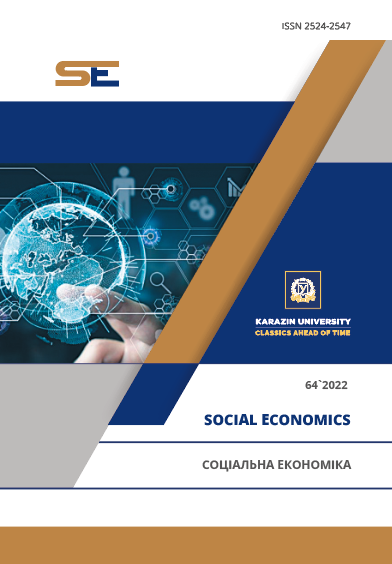ОЦІНКА МІГРАЦІЙНИХ НАСТРОЇВ ТА ПРОФЕСІЙНИХ УСТРЕМЛІНЬ НАУКОВЦІВ В УМОВАХ ВІЙНИ В УКРАЇНІ
Анотація
В статті досліджено наміри українських науковців, викладачів, студентів та дослідників щодо подальших кроків у своїй професійній діяльності та планів щодо академічної кар’єри. Для цього було проведено опитування українських науковців, діяльність яких зазнала змін під впливом російської військової агресії. Визначено, що війна в Україні внесла зміни в здійснення науково-дослідної роботи, оскільки 22,4% респондентів не мають на сьогодні достатніх умов та можливостей для продовження наукових досліджень. Результати опитування дозволяють стверджувати про суттєві обсяги інтелектуальної міграції з України, спричиненої війною. Оцінюючи зміни в професійному оточенні, 29,3% респондентів зазначили, що особисто знають до 5 осіб, які були змушені виїхати з України в пошуках безпечного місця проживання. Водночас 28% опитаних відповіли, що знають більше як 10 таких осіб. Проаналізовано рівень участі в навчальному чи науково-дослідному процесі інтелектуальних мігрантів. Переважна більшість респондентів у своїх відповідях зазначили (79,9%), що науковці та дослідники, які залишили Україну після початку військових дій на її території, продовжують віддалено працювати в Україні. Водночас 14,4% опитаних зазначають, що така вимушена міграція позитивно вплинула на навчальну чи науково-дослідну діяльність, оскільки вони знайшли нову (або додаткову) можливість викладацької або дослідницької роботи у зарубіжному закладі. Важливою позитивною рисою міграційних настроїв українських науковців, дослідників та викладачів є їх прагнення продовжувати навчально-освітню діяльність, навіть якщо війна не завершиться найближчим часом – 76,2% респондентів дали ствердну відповідь на таке запитання. Здійснене наукове дослідження дозволяє стверджувати про високу цінність науково-дослідної діяльності навіть в умовах війни в Україні.
Завантаження
Посилання
Nychkalo, N. H., & Hordiienko, V. P. (2022). Naukova diialnist u dobu viiny: za kamertonom sertsia i liubovi do batkivshchyny. [Scientific activity during the war: at the tuning fork of the heart and love for the motherland]. Bulletin of the National Academy of Pedagogical Sciences of Ukraine, 4(1). doi: https://doi.org/10.37472/v.naes.2022.4123. (in Ukrainian)
Nezhyva, М., & Mysiuk, V. (2022). War in Ukraine: challenges for the global economy. Foreign trade: Economics, Finance, Law, 121(2), 16-25.
Alhaffar, M.H.D., & Janos, S. (2021). Public health consequences after ten years of the Syrian crisis: a literature review. Globalization and Health, 17(1), 1-11.
Yu, H. (2019). A brief analysis of the financial crisis of 2008. Proceedings of Business and Economic Studies, 2(4).
Ladi, S., & Tsagkroni, V. (2019). Analysing crisis parliamentary discourse in Greece: Whom should we blame? JCMS: Journal of Common Market Studies, 57(4), 729-748.
Suntana, I., & Tresnawaty, B. (2021). Multidimensional Social Crisis and Religious Violence in Southeast Asia: Regional Strategic Agenda, Weak Civilian Government, Triune Crime, Wealth Gaps, and Coopted Journalism. Journal of Culture and Values in Education, 4(2), 1-13.
Panu, P. (2020). Anxiety and the ecological crisis: An analysis of eco-anxiety and climate anxiety. Sustainability, 12(19), 7836.
Korbel, J. O., & Stegle, O. (2020). Effects of the COVID-19 pandemic on life scientists. Genome Biol, 21, 113. doi: https://doi.org/10.1186/s13059-020-02031-1
Oliinyk, O., Bilan, Y., & Mishchuk, H. (2021). Knowledge Management and Economic Growth: The Assessment of Links and Determinants of Regulation. Central European Management Journal, 29(3), 20–39.
Bautista, E. G., & García, R. C. (2020). La formación de talento e innovación a través de la vinculación y los modelos de hélice basados en la sociedad del conocimiento. RIDE Revista Iberoamericana Para La Investigación Y El Desarrollo Educativo, 10(20). doi: https://doi.org/10.23913/ride.v10i20.641
Boshra, A. Arnout. (2020). Investing scientific research outputs in light of crises and disasters: (COVID-19 crisis as a model). Journal of public affairs, 20(4), e2356. doi: https://doi.org/10.1002/pa.2356
Chacón-Labella, J., Boakye, M., Enquist, B.J., Farfan-Rios, W., Gya, R., Halbritter, A.H., Middleton, S.L., Jonathan von Oppen, Pastor-Ploskonka, S., Strydom, T., Vandvik, V., & Geange, S.R. (2021). From a crisis to an opportunity: Eight insights for doing science in the COVID-19 era and beyond. Ecology and Evolution, 11, 3588–3596. doi: https://doi.org/10.1002/ece3.7026
Kolot, A., Kozmenko, S., Herasymenko, O., & Štreimikienė. D. (2020). Development of a decent work institute as a social quality imperative: Lessons for Ukraine. Economics and Sociology, 13(2), 70-85. doi: https://doi.org/10.14254/2071-789X.2020/13-2/5
Fylypovych, L. (2022). Suchasna mihratsiia ukraintsiv yak naslidok rosiiskoi ahresii: problema dukhovnoi opiky. [Modern migration of Ukrainians as a result of Russian aggression: the problem of spiritual guardianship]. Grail of Science, 18-19, 291-296. doi: https://doi.org/10.36074/grail-of-science.26.08.2022.49 (in Ukrainian)
Almustafa, M. (2022). Reframing refugee crisis: A “European crisis of migration” or a “crisis of protection”? Environment and Planning C: Politics and Space, 40 (5), 1064-1082. doi: https://doi.org/10.1177/2399654421989705
Dines, N., Montagna, N., & Vacchelli, E. (2018). Beyond Crisis Talk: Interrogating Migration and Crises in Europe. Sociology, 52/3, 439-447. doi: https://doi.org/10.1177/00380385187673
Cristea, L. A, & Grabara, J. (2019). Fiscal impact of the migration phenomenon. Journal of International Studies, 12(4), 144-159. doi: https://doi.org/10.14254/2071-8330.2019/12-4/10
Lazaretou, S. (2022). The Greek Brain Drain: The New Pattern of Greek Emigration During the Recent Crisis (July 22, 2022). Bank of Greece Economic Bulletin, 43, 3.
Ganga, R. N, Silva, J. P., Vaz, H., Gomes, R., Teixiira Lopes, J., Cerdeira, L., Silva, S., Gil Cabrito, B., Magalhaes, D., Machado-Taylor, M.D.L., et all. (2018). De Portugal a Europa. La sociología de la migración científica a nivel pormenorizado en tiempos de crisis de la Eurozona. Migraciones Internacionales, 9(35), 9–38. doi: https://doi.org/10.17428/rmi.v9i35.449
Sysoieva, S. O., & Osadcha, K. P. (2019). Stan, tekhnolohii ta perspektyvy dystantsiinoho navchannia u vyshchii osviti Ukrainy. [Status, technologies and prospects of distance learning in higher education of Ukraine]. Information technologies and teaching aids, 70 (2), 271-284. (in Ukrainian)





